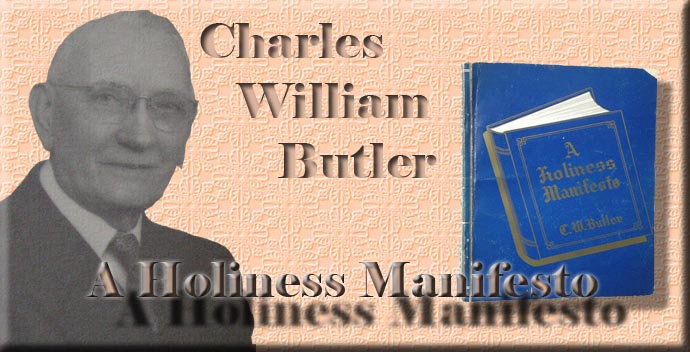
A Holiness Manifesto
By Charles William Butler
Chapter 13
The Method By Which God Makes Us HolyThe method God has chosen and provided for the accomplishment of this great purpose is by the sanctification of the Holy Spirit. "God hath from the beginning chosen you (his believing people) to salvation through sanctification of the Spirit and belief of the truth whereunto he called you by our Gospel, to the obtaining of the glory of our Lord Jesus Christ" II Thess. 2:13, 14. That is, he has chosen you to final salvation -- to the obtaining of the glory of our Lord Jesus Christ, by the route of the work of the Holy Spirit in sanctifying you wholly. The sanctification of each one personally is provided by the shed blood of Christ, and wrought in and for us by the agency of the Holy Spirit. This is the route to the experience and life of true holiness. There are two sides to the work of the Spirit in the experience of true holiness: first, he destroys sin; then cleanses the temple. He cleans house, "being then made free from sin, ye have your fruit unto holiness, and the end everlasting life." Mr. Wesley in defining this experience says, "It is an instantaneous deliverance from all sin." The second phase of the Spirit's work in this experience is to reveal in us the things of which Paul speaks in I Cor. 2:9. "It is written, eye hath not seen, nor ear heard, neither have entered into the heart of man, the things which God hath prepared for them that love him. But God hath revealed them unto us by his Spirit; for the Spirit searcheth all things, yea the deep things of God." Paul speaks of some of these things the Spirit reveals as "the mystery hidden from generations and ages, but now is made manifest to his saints: To whom God would make known what is the riches of the glory of this mystery among the Gentiles; which is Christ in you, the hope of glory" Col. 1:26, 27. An enthroned, indwelling, unveiled and glorified Christ in you. "That Christ may dwell in your hearts by faith; that ye being rooted and grounded in love, may be able to comprehend with all saints what is the breadth and length and depth and height, and to know the love of Christ which passeth knowledge, that (in order that) ye might be filled with all the fullness of God" Eph. 3:17-19. These Scriptures set forth the positive side of the highest standard of New Testament experience and life. Mr. Wesley's definition referred to above continues to cover this side of the experience, when he, after declaring holiness to be "an instantaneous deliverance from all sin," and an "instantaneous power then given always to cleave to God." This involves the "gift of righteousness" which is imparted righteousness, which prepares our selfhood as the temple for his earthly habitation. This is the positive side of the experience of true holiness. It consummates the believer's highest spiritual union with God, and prepares us for right world relationship and for world conquest. There is a standard not only of experience, but also of life, for this New Testament experience and life. There is an established order for living the life. For want of a better way of expressing it I am going to call it the law of this life. There are two very wonderful universal terms used in the New Testament. One is that grand word "Whosoever." We all love that "Whosoever will" with which God makes his last heartbreaking appeal to all men. But there is another equally important and within the limits of its proper application equally universal term. It is "Whatsoever." This word represents the aim and conduct of all who know the life hidden with Christ in God. The single standard life. It is all-inclusive for our total living. "Whether therefore ye eat or drink, or whatsoever ye do, do all to the glory of God." Again in Col. 3:17, "And whatsoever ye do in word or deed, do all in the name of the Lord Jesus, giving thanks to God and the Father by him." This whatsoever is the final standard by which as holy people we determine our conduct. The final and perfect definition of sin is, "Whatsoever is not of faith is sin." Amen. Anything that hinders or clouds faith is sin for us. Dr. H. C. Morrison told me once that when the moving picture first came on the scene, he attended twice. He said he found after attending that when he went to prayer, he was hindered. His mind would not let go of the things he had seen and heard in the movie. He never attended another one from then on. I wonder how about the time spent looking at the T.V. in your home. Does it make devotions richer and deeper, or is your mind filled with the scenes and sounds which at best are not devotional. This wonderful universal term will enable us to judge aright in every relationship and activity of our total living. To obey it will keep the crown on the brow of our risen Lord which makes him King in our lives. "If we do not crown him Lord of all, we do not crown him Lord at all."
|
|
 |
 |
|
|
|
-
Site Navigation
 Home
Home What's New
What's New Bible
Bible Photos
Photos Hiking
Hiking E-Books
E-Books Genealogy
Genealogy Profile
Free Plug-ins You May Need
Profile
Free Plug-ins You May Need
 Get Java
Get Java.png) Get Flash
Get Flash Get 7-Zip
Get 7-Zip Get Acrobat Reader
Get Acrobat Reader Get TheWORD
Get TheWORD